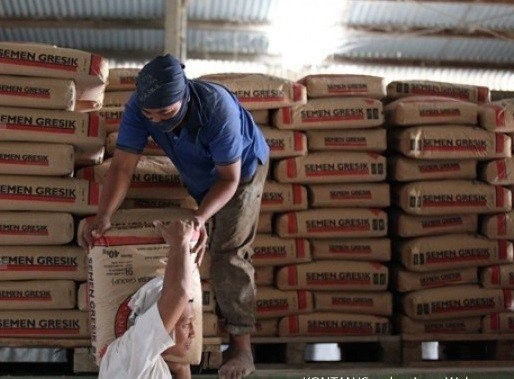Popular Reads
Top Results
Can't find what you're looking for?
View all search resultsPopular Reads
Top Results
Can't find what you're looking for?
View all search resultsBrakes to be put on aggressive cement expansion
Change text size
Gift Premium Articles
to Anyone
I
n an effort to maintain the stability of cement prices, the government is preparing a regulation to curb the aggressive expansion of cement producers feared to trigger oversupply.
Industry Minister Airlangga Hartarto said his side was formulating a ministerial regulation that would stipulate a moratorium on the issuance of permits for new cement factories.
“We’ve been talking about the moratorium [policy] as well as some other ways to accommodate existing [cement] oversupply,” he told reporters recently.
The ministry’s director general for chemicals, textile and miscellaneous industry, Achmad Sigit Dwiwahjono, has also confirmed the proposed regulation.
“God willing,” he said, when asked whether the regulation would be issued this year.
Sigit said the regulation would also include tougher requirements for opening new factories, including the availability of advanced production technology and the implementation of environmentally friendly practices.
The country saw a slight increase in nationwide cement sales of 1.6 percent to 61 million tons last year, way below the industry’s heyday in 2012 when sales had grown 14.5 percent, data from the Indonesian Cement Association (ASI) shows.
The robust growth then attracted more producers from abroad to tap into the huge market. The number of cement producers in Indonesia surged to 19 this year from only nine in 2012.
Total annual production capacity has nearly doubled from 59.3 million tons in 2012 to 92.7 million tons this year, while demand is predicted to only reach up to 65 million tons, creating excessive production capacity by 27.7 million tons.
“This really concerns industry players as sales continue to decrease every year,” ASI chairman Widodo Santoso said.
Widodo urged the government to implement the moratorium immediately. “If demand stabilizes, the government can lift the moratorium in the future.”
As a result of the overcapacity, major players, such as state-run Semen Indonesia (SI) and privately owned Indocement Tunggal Prakarsa, have inevitably seen their sales performance slow.
SI, the country’s top cement producer, booked 1.19 percent sales volume growth during the first semester, while Indocement, the second biggest, saw sales volume down by 2.3 percent.
SI corporate secretary Agung Wiharto said the firm supported the government’s plan to put the brakes on expansion to minimize the current price war.
“In times of oversupply, firms compete to offer the lowest price. This is not healthy because the bigger producers can eat the smaller ones,” he said over the phone.
To manage excessive production, firms such as SI have been trying to increase exports to the Maldives, Taiwan and Timor Leste as well as increase the local production of precast concrete, which uses cement as raw material.
SI, however, reported that its export proportion only stood at between 2 and 3 percent from overall sales, as domestic demand for cement is still vast, only with tighter competition.
Data from Indocement, meanwhile, shows that during the first six months of 2016, the volume of cement sales from all industry players dropped 0.13 percent in Java and 10.79 percent year-to-date (ytd) in Kalimantan, unlike eastern region demand, which grew, with Sulawesi leading at 21.37 percent followed by eastern Indonesia at 18.31 percent.
Minister Airlangga also urges local firms to expand production in eastern Indonesia, where supply is still low.
“Chinese cement maker Conch has built a factory with 6 million capacity in West Papua. We need to appreciate this because it wants to support infrastructure construction in the area at a lower price. The question is why don’t our own state enterprises build factories there?” he said.










